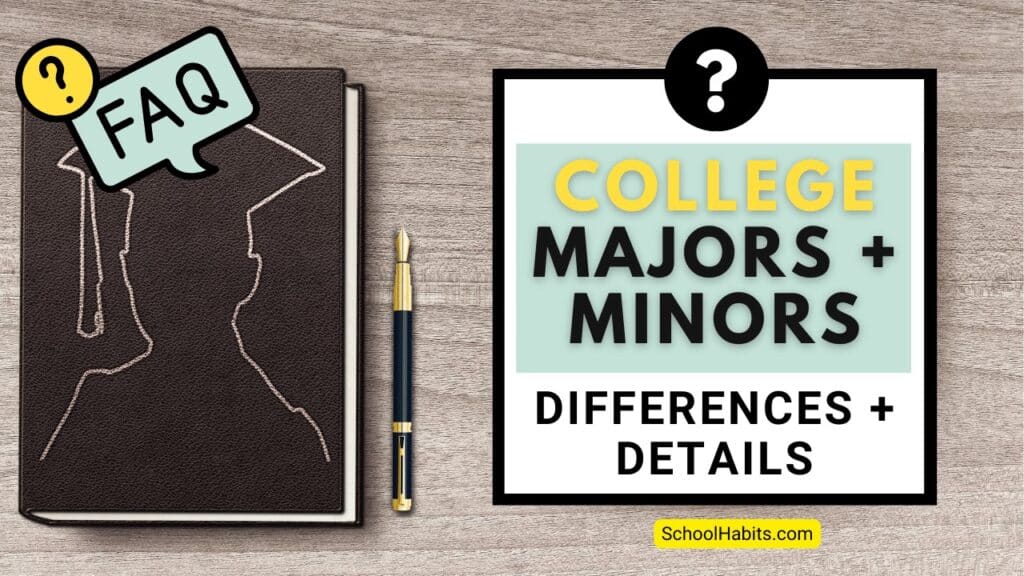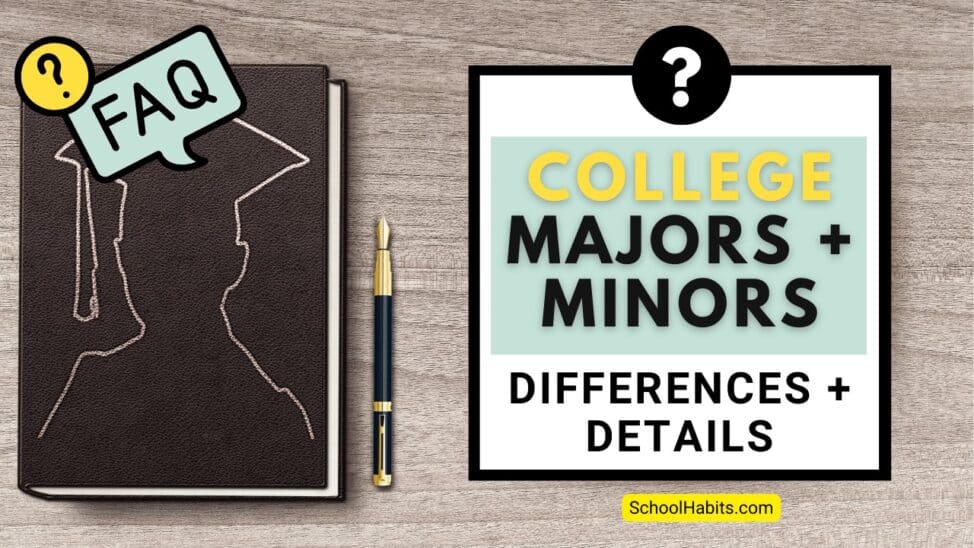By Katie Azevedo, M.Ed.

I have organized the following guide as a series of common questions I receive from college-bound students and/or their parents. I keep my answers simple and brief because this guide is intended to offer an overview. (If you’re a high school senior who’s already been accepted to college, do these 5 things.)
What is the difference between a college major and a minor?
- College Major: a primary concentration of studies (think of this as your main interest)
- College Minor: a secondary concentration of studies; may or may not complement your major
| Major | Minor |
| Primary concentration of studies | Secondary concentration of studies |
| Most classes you take will be in this area/topic | Take fewer classes in this area, but still a good amount |
| Must always have at least one major to graduate | Don’t necessarily need a minor to graduate (see below) |
| Possible to have multiple majors, but unnecessary | Will often complement the major |
Who are college majors and minors for? Do I need one? Do I need both?
Students earning a bachelor’s degree from a four-year college must choose some combination of majors and minors.
Most students graduate with one major and one minor. Some students graduate with multiple majors and no minor. (See below.)
What is a double major?
When a student “double majors” in college, it means they are taking enough course credits to satisfy the requirements of two full majors.
A double major is a ton of work and isn’t always necessary. Avoid choosing a double major just because it “looks good.” Happy and healthy students with one major are better off than anxious, overwhelmed students with multiple majors.
To achieve a double major, you may need to take summer courses, winter courses, or extend your graduation date. There is only so much time in the academic school year.
Does my minor have to match my major?
No. It can make sense to choose a minor that supports your major, but it’s not necessary to do so. For example, you could have a complementary combination by majoring in Engineering and minoring in architecture, or majoring in Marketing and minoring in psychology. Or you could major in Engineering and minor in Japanese.
Most students choose minors that complement their majors because it’s actually helpful when job searching. But again, no hard rule here.
When do I pick my college major and minor?
Students are often required to choose majors and minors by their second year (sophomore), but this varies by school and program.
Can I change my major and minor?
Yes. It’s not impossible to change a major or minor once you’ve started, but there is kind of a point of no return if you want to graduate on time. If you change your major too late, you may need to take summer courses or extend your graduation date.
Do all schools have the same majors and minors?
Not entirely. Not all schools offer the exact same majors and same minors. You have to research each college to see what it offers. But, all colleges will offer majors and minors in core content areas such as English, math, history, psychology, etc. To research a school’s offerings, just go to its website. Here is a list of majors/minors offered by Boston College, for example. And here is what UCLA offers. And here is a list of common majors, put together by ACT.org.
Once I pick my major, how do I pick what courses to take?
When you pick a major, most of your college courses will be on that topic. You might have to take certain courses before others. (Example: Psychology Basics 101 comes before Psychology and Behavioral Medicine 305.) You work with your college advisor to create your course plan.
Once you choose a major and minor, you will take a combination of required and self-selected courses. In other words, you’ll need to take certain core courses in your concentration (these are chosen for you), but then you can fill some of your credits with courses of your choice within that concentration. Sometimes these courses are called electives.
What major should I choose?
Choose college majors and minors that align with your career goals, interests, and skills. Do not choose your major based on a) what your parents want, or b) what sounds fancy. Some concentrations are general enough to apply to multiple careers, while others are more narrow fields. For example, an English major might find success as a teacher, journalist, TV producer, or advertisement specialist. A marketing major could find success in nearly any industry. I don’t hate this Guide To Choosing A Major (CollegeBoard.org) – although it’s super basic.
What about Pre-Med, Pre-Vet, and Pre-Law?
Students who know they want a career as a doctor, dentist, veterinarian, or lawyer will choose a major in one of the core sciences (biology, neurobiology, neurochemistry, etc.) and then choose Pre-Med or Pre-Vet as a concentration track. This is a rigid track of pre-selected and required courses for all four undergraduate years (plus more). Students who want to be lawyers will choose a law-related major (English, history, political science, philosophy, etc.) and then enroll in the Pre-Law track. Pre-Med, Pre-Vet and Pre-Law students have less flexibility when choosing courses, as they must satisfy particular requirements for medical or law school.
Need help with your college application essays? I’ve got you. Stressed out about asking people to write your college recommendation letters? Read this.

